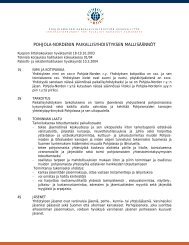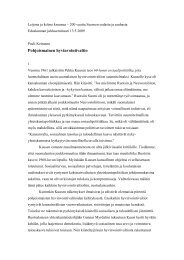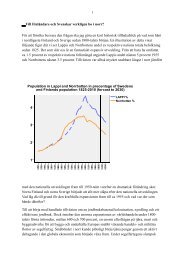The Nordic Model - Embracing globalization and sharing risks
The Nordic Model - Embracing globalization and sharing risks
The Nordic Model - Embracing globalization and sharing risks
You also want an ePaper? Increase the reach of your titles
YUMPU automatically turns print PDFs into web optimized ePapers that Google loves.
Many people want to<br />
retire early – but<br />
should be encouraged<br />
to prolong their working<br />
careers<br />
long-run perspective it is an anomaly that the statutory retirement<br />
ages (62, 63 <strong>and</strong> 68) are kept fixed while longevity increases.<br />
<strong>The</strong>re are several reasons why retirement may take place too<br />
early as seen from the perspective of society. First, taxation (in<br />
combination with various forms of means testing <strong>and</strong> supplements)<br />
implies that the return for continued work <strong>and</strong> later retirement is<br />
smaller for the individual than for the society even if the benefits<br />
are actuarially fair. <strong>The</strong> reason is that the labour income earned<br />
by postponing retirement is taxed (while leisure is not).<br />
Second, even though indexation of benefits to longevity<br />
provides incentives for individuals to retire later when longevity<br />
increases, the system does not automatically ensure that this<br />
takes place. This is so since the statutory ages that apply to the<br />
various schemes are not indexed, <strong>and</strong> because individuals may<br />
underestimate longevity. Finally, with rising incomes there may<br />
be a preference shift with an increasing focus on leisure in the<br />
“third phase” of life.<br />
Ageing is often perceived as an issue of pensions <strong>and</strong> retirement<br />
only. While these issues are important, one should stress<br />
that there are other financing concerns related to ageing. <strong>The</strong>se<br />
include welfare provisions such as health <strong>and</strong> old age care. Financing<br />
the latter is also strongly dependent on the age composition<br />
of the population. More people – both relatively <strong>and</strong> absolutely<br />
(<strong>and</strong> particularly the very old) – will be in need of old age care<br />
<strong>and</strong> health services in the future. While increasing longevity is<br />
associated with more healthy ageing, there will nevertheless be<br />
an increasing pressure on health <strong>and</strong> old-age care if the old are in<br />
the future to have the same access to welfare services as currently.<br />
This requires more resources <strong>and</strong> raises financing issues beyond<br />
that of pensions.<br />
4.5 EASY FIXES?<br />
In the debate on the consequences of the ageing of society, it is<br />
often claimed that there are some easy solutions. Let us consider<br />
a few of these.<br />
Demographics: from tail-wind to head-wind · 75

















